Reply To:
Name - Reply Comment
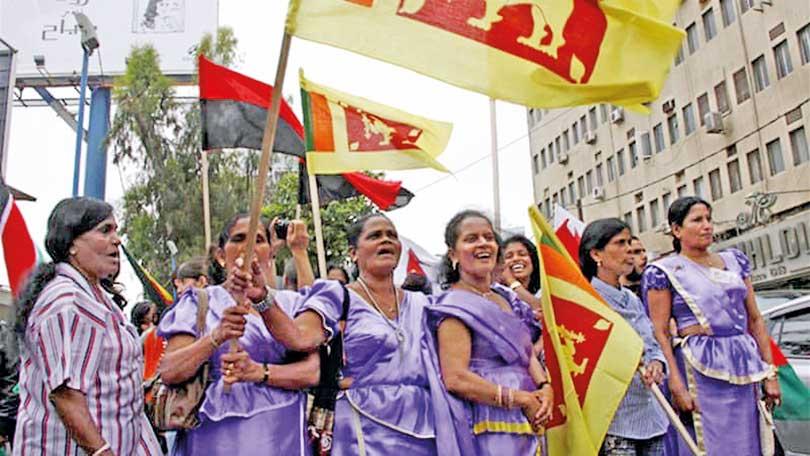
 The International Women’s Day culminated with vibrant celebrations and appreciation toward women who have succeeded in life. And then, there are those women who represent the estate sector, farmer and fisheries communities, janitorial service, prostitution and many other blue-collar professions that never get appreciated. Female migrant labourers too are part of this segment. Amid numerous hardships and ordeals, they continue to send in dollars to bolster the economy. In a recently launched publication titled ‘Foreign Migrant Labour Mafia: The Blood, Tears and Coins,’ it was revealed that between 2009 and 2017, as many as 822,758 women have left for work in Middle Eastern countries. According to the Economic and Social Statistics 2019 report published by the Central Bank, the revenue generated by those working in the Middle East alone stood at USD 3,592 million. The publication was drafted by Nidahasa Udesa Kantha Vyaparaya or ‘Free Women’ – a leftist movement which continues its struggle towards women’s freedom and makes a change in the existing social system.
The International Women’s Day culminated with vibrant celebrations and appreciation toward women who have succeeded in life. And then, there are those women who represent the estate sector, farmer and fisheries communities, janitorial service, prostitution and many other blue-collar professions that never get appreciated. Female migrant labourers too are part of this segment. Amid numerous hardships and ordeals, they continue to send in dollars to bolster the economy. In a recently launched publication titled ‘Foreign Migrant Labour Mafia: The Blood, Tears and Coins,’ it was revealed that between 2009 and 2017, as many as 822,758 women have left for work in Middle Eastern countries. According to the Economic and Social Statistics 2019 report published by the Central Bank, the revenue generated by those working in the Middle East alone stood at USD 3,592 million. The publication was drafted by Nidahasa Udesa Kantha Vyaparaya or ‘Free Women’ – a leftist movement which continues its struggle towards women’s freedom and makes a change in the existing social system.
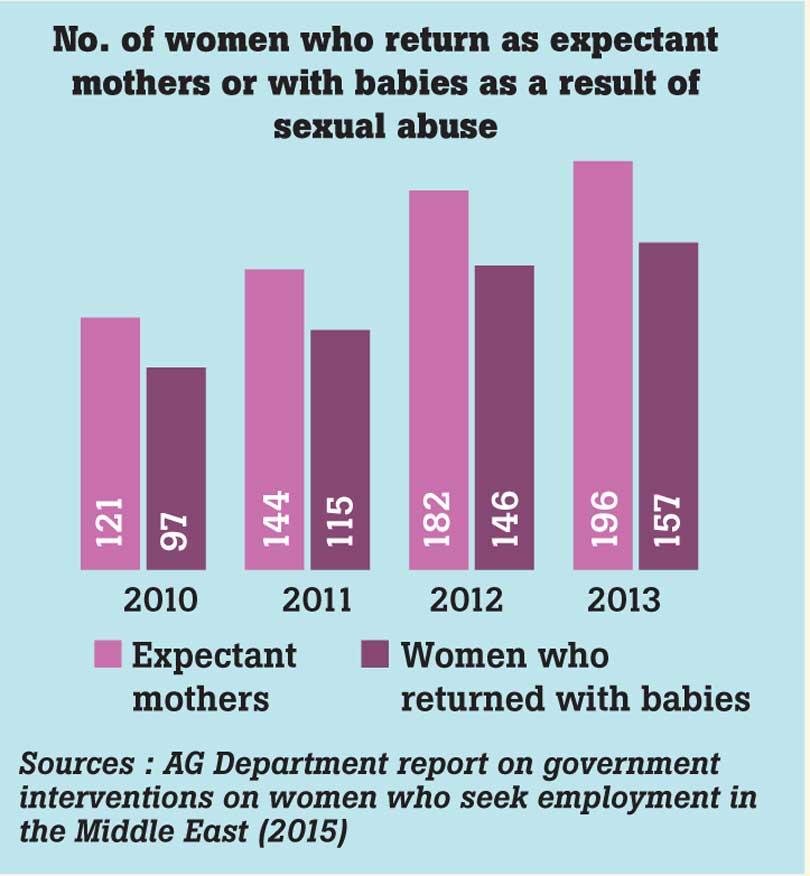
The book includes data collected through filing RTIs and real-life experiences from those who have toiled overseas. It sheds light on reasons why women opt for foreign employment, brutalities they undergo and startling statistics.
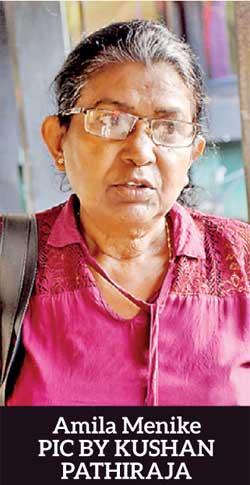 “We think the Sri Lanka Bureau of Foreign Employment (SLBFE) has all information related to migrant workers,” said Kumudu Munasinghe, member of the Free Women. “Sadly, this institution that has to think about the wellbeing of migrant workers doesn’t have all data. We realised there’s no inter-departmental harmony among these institutions and that they don’t publicise such data. We received limited data even after filing an RTI. When we met some of our sisters, they spoke to us in fear. There were instances when they were forced not to give out actual data. This shows that though we need the dollars they bring, they are not allowed to speak about the harsh experiences they encounter. This reflects the backward mentality of our society. Many of them never utter their grievances thinking they’d be traumatised. At times, they become sex workers. Some of their husbands never know what happened to them. Since we were part of the struggle, we wanted to expose the truth about their hardships. One of the objectives of penning down this book was to grab the attention of society towards this issue. Apart from that, there are male migrant workers as well. Females live in houses with many conditions. Data related to deaths and those with disabilities and mental disorders are high. They don’t have insurance or any kind of safety whatsoever. Through this profit-making process, there is no value placed on human life. When people come back in coffins, a similar number of workers are sent abroad to replace those who have left us. There are some who have died, others with disabilities, psychological conditions and some have contracted various illnesses such as HIV. Children of these mothers have taken to drugs and their families have split. When compared with those who died during the war, those dying due to this ‘migrant worker mafia’ are much more. They deserve due respect for bringing in the dollars. We have a right to live as humans. What we dislike is the labour mafia that exists within the capitalist movement.”
“We think the Sri Lanka Bureau of Foreign Employment (SLBFE) has all information related to migrant workers,” said Kumudu Munasinghe, member of the Free Women. “Sadly, this institution that has to think about the wellbeing of migrant workers doesn’t have all data. We realised there’s no inter-departmental harmony among these institutions and that they don’t publicise such data. We received limited data even after filing an RTI. When we met some of our sisters, they spoke to us in fear. There were instances when they were forced not to give out actual data. This shows that though we need the dollars they bring, they are not allowed to speak about the harsh experiences they encounter. This reflects the backward mentality of our society. Many of them never utter their grievances thinking they’d be traumatised. At times, they become sex workers. Some of their husbands never know what happened to them. Since we were part of the struggle, we wanted to expose the truth about their hardships. One of the objectives of penning down this book was to grab the attention of society towards this issue. Apart from that, there are male migrant workers as well. Females live in houses with many conditions. Data related to deaths and those with disabilities and mental disorders are high. They don’t have insurance or any kind of safety whatsoever. Through this profit-making process, there is no value placed on human life. When people come back in coffins, a similar number of workers are sent abroad to replace those who have left us. There are some who have died, others with disabilities, psychological conditions and some have contracted various illnesses such as HIV. Children of these mothers have taken to drugs and their families have split. When compared with those who died during the war, those dying due to this ‘migrant worker mafia’ are much more. They deserve due respect for bringing in the dollars. We have a right to live as humans. What we dislike is the labour mafia that exists within the capitalist movement.”
“I wanted a brick house like everyone else in my neighbourhood did and hence went to work in Kuwait,” said one of the migrant workers in her testimony on the documentary titled ‘4th of February.’ The insightful captures by Nadya Bimani Perera spoke volumes about what women really go through, inadequate interventions by the government and relevant embassies and their plight in foreign land. It sheds light on how the local justice system failed to represent Rizana Nafeek, discussions among representatives in various authorities who promised to strengthen training, raise the age limit and educational qualifications. One of the migrant workers spoke about how she was raped and sold to a Bangladeshi and eventually became a sex worker. She is now living with HIV.
Furthermore, the comprehensive documentary unearths pre-departure training done at SLBFE where applicants are taught how to look after children and do household chores. They don’t sign any contract or have insurance documents either. Some countries don’t have embassies and these women have nowhere to go to. Although they go as housemaids, they are taken for other jobs. Some women who are raped are expecting or have children while some others have lost their minds due to severe trauma.
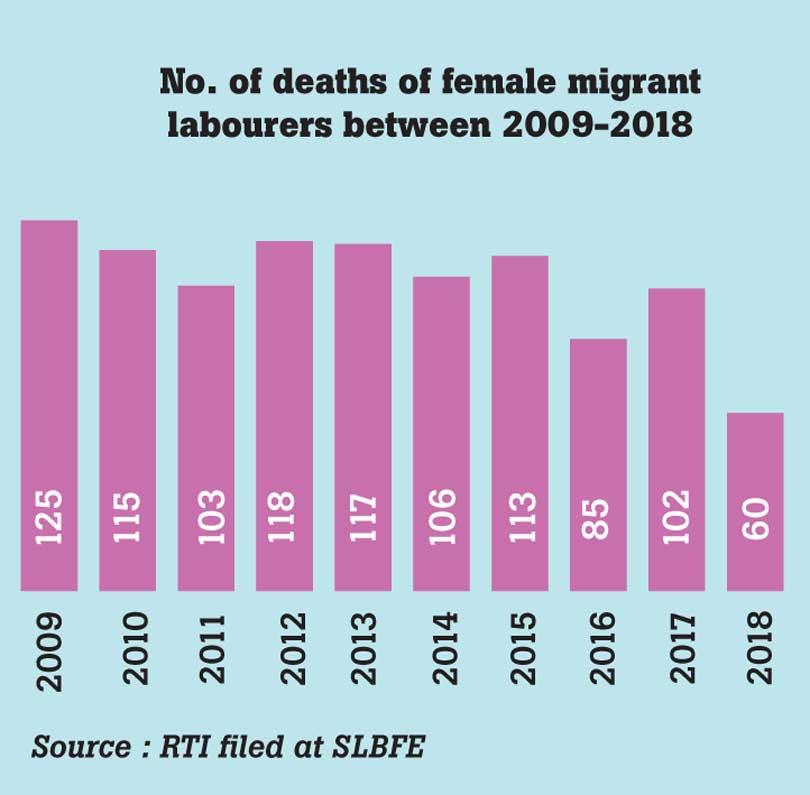
“I was in Dubai for 11 years, researching the plight of Sri Lankan girls who seek foreign employment,” recalled Amila Menike from Dankotuwa while speaking to Daily Mirror. “Back in 1988, 75% of girls who went for foreign employment didn’t even know to place their signatures. They get to eat leftovers from neighbouring houses, get raped and impregnated but nobody is there to speak on behalf of them. On many occasions, female migrant workers are sold to Bangladeshis. Many of them die and those numbers never get reported. After 11 long years, I returned to Sri Lanka.”
However, financial constraints forced Amila to leave for Jordan. “I went to work as a sales assistant but was asked to work in a house. The family had US citizenship and until they came I was locked up in a room. I escaped and was handed over to a Sri Lankan. He took me to the embassy and when I demanded for compensation, I was given to eat two rottis and eggs. I joined 57 other female migrant workers who were put into a size 10’ 12” room. We had to live like broiler chicken. They have their toothbrushes and essentials inside a small pouch and take turns to sleep. They bathe once a week. During winter, there’s no heater and we have to break ice to open the door.”
“When employed at a house, we don’t get the first month’s salary,” she said. “But these situations become worse when people in these families put their valuables in our handbags and frame us as looters. Thereafter, we are locked inside a room where they torture us. This is how I spent two years in Jordan and later decided to come back.”
According to Amila, girls from as far as Nuwara Eliya, Divulapitiya, Kosgoda and Katukithula are trapped in Jordan, expecting a saviour to arrive and let them out, before they get raped or become psychologically ill as a result of torture and trauma they encounter on a daily basis.
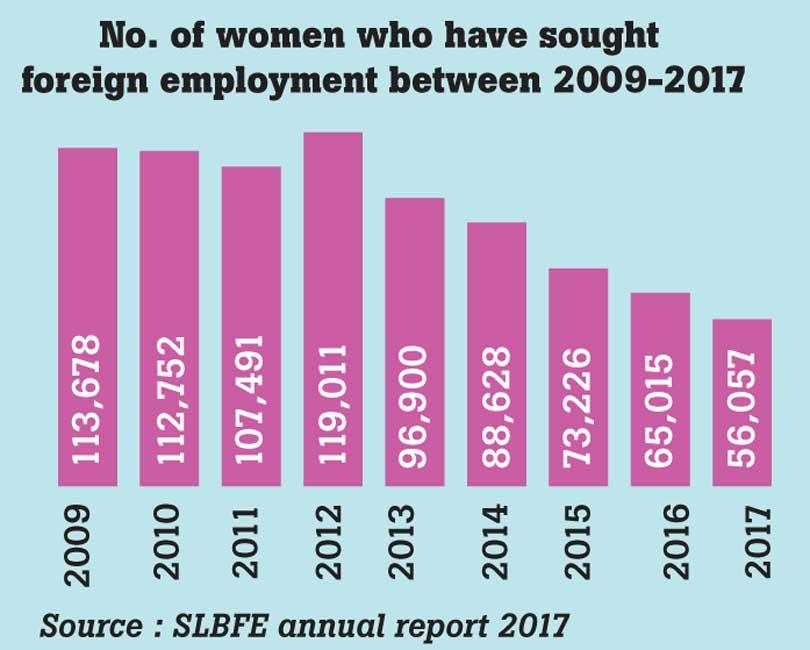
According to the book, 89% of women who seek employment in Middle Eastern countries as housemaids have no training at all. As per the educational qualifications, 47% of them have passed grades six through ten while 43% have completed higher studies and 30% have passed O/Ls. Three main reasons for them to seek foreign employment are abject poverty, unemployment and family issues. Moreover, the book sheds light on illegal agencies. According to the SLBFE Act 1985 No. 21, only registered agencies are allowed to send manpower. However, a drop has been observed in the numbers that seek employment in registered jobs from 300,703 in 2014 to 211,459 by 2018. This is due to the mushrooming of illegal agencies and intermediaries that traffic foreign labour to these countries. As a result, some are cheated, some promised visas and others pay exorbitant amounts to fulfil their dreams, but eventually end up in worse situations. Some work without getting paid and complaints are as high as 2012 in 2013 alone. During the same year, 196 of them have returned to Sri Lanka as expectant mothers due to rape and sexual abuse while another 157 returned with their illegitimate babies. Between 2009 and 2018, a total of 1,044 of them have died.